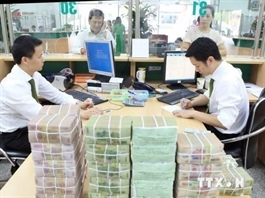Vietnam eyes foreign investment boost for banking sector
Vietnam eyes foreign investment boost for banking sector
At the meeting conference between the prime minister and foreign investors on October 17, Pham Thanh Ha, Deputy Governor of the State Bank of Vietnam (SBV), gave a warm welcome to foreign investors as they stood ready to address the challenges faced by underperforming Vietnamese banks.

At the conference, Minh Do, country director of Warburg Pincus, said, "It's essential for the Vietnamese government to re-evaluate strategies to raise capital for domestic banks." Minh Do went on to suggest an expansion of the foreign ownership limit could foster credit growth.
Addressing this, Ha reiterated the current regulations, which permit foreign investors to own a maximum of 30 per cent of a domestic credit institution.
According to Deputy Minister of Finance Cao Anh Tuan assets of foreign-invested enterprises (FIEs) in the finance, banking, and insurance sector account for approximately 10 per cent of total foreign direct investment assets.
"The SBV is also restructuring domestic credit institutions and prioritising increased ownership for investors that can help transform and renew underperforming banks. Foreign investors can actively participate in addressing these weaker banks," Ha said.
Reiterating the importance of foreign direct investment for Vietnam's socioeconomic development, Ha said, "The long-term and sustainable investment strategies of FIEs are highly commendable. However, considering the financial and monetary security of an open economy like Vietnam's, the SBV needs to be cautious with capital flows to ensure the stability of the financial market."
Ha made assurances that the SBV will continue to ensure liquidity for the economy, an action critical for the financial environment, businesses, residents, and FIEs alike, and that the institution strives for stability and flexibility when setting interest rates.
"This year, the SBV is among the few central banks that could reduce operational interest rates. As a result, the market rates have decreased, allowing businesses and foreign investors better access to capital and credit at lower costs," Ha added.
























